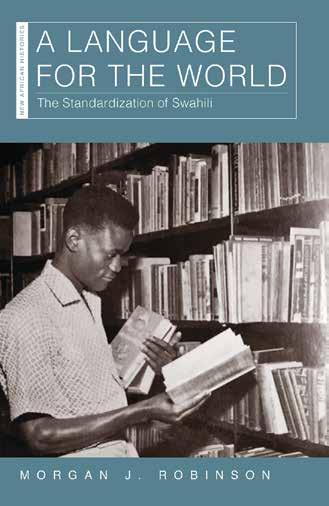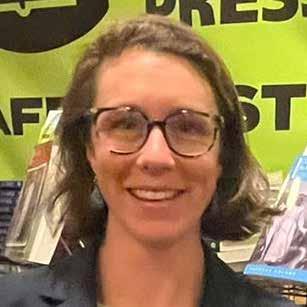
7 minute read
FROM CLASSROOM TO CONTINENT MSU historian explores Swahili’s global journey
By Sarah Nicholas
Dedicated to uncovering the rich and complex history of Swahili, one of Africa’s most widely spoken languages, Mississippi State University Associate Professor of History Morgan J. Robinson has made it the focus of her career.
Robinson’s journey into the study of Swahili, or Kiswahili studies, began not in Africa but in a college classroom where she sought to learn a new language.
“When I got to college, I was not sure exactly what I wanted to major in, but I did know that I wanted to learn a new language. Then, as now, I loved the idea of expanding my ability to communicate with more and more people,” she said. “I walked into Swahili I, and it shaped the rest of my life.”
Her first book, “A Language for the World: The Standardization of Swahili” (Ohio University Press, 2022), explores the process by which Swahili was standardized and how the portability of that standard has contributed to its spread across the African continent and beyond. A pivotal moment in her research came when she read a letter written by a missionary in 1878, describing the frustration potential volunteers felt when faced with the daunting task of learning Swahili.
“Everyone who has ever tried to study a foreign language knows it is hard, takes time and will never be perfect,” Robinson said. “It was this gap between my own lived experience of language learning and the glossing over of the effort in the historical literature about language
“A piece of advice that has nothing to do with language but which I regret not doing as an undergraduate: Go visit your professors during office hours! We are sitting there with the express purpose of talking to students, and those outside-of-the-classroom interactions go a long way toward building rewarding intellectual relationships.” –Morgan Robinson learning that planted the first seed of an idea for what, at the time, was my dissertation project.”
Robinson’s book was born from her firsthand experience with language learning, as well as her recognition that historical accounts often gloss over the laborious process of mastering a new language.
“The book tells the story of how the Swahili language became standardized over the course of the 19th and 20th centuries,” Robinson said. “It is comprised of the intertwined narratives of formerly enslaved children and missionaries, clerks and colonial officials, poets and politicians all wound together to show the language as we know it today was created by a host of people, all working on different timelines and for different reasons on projects that together produced Standard Swahili.”
The process of standardizing Swahili, as Robinson said, was anything but straightforward. The history she traces reveals a range of perspectives—scholars, linguists and everyday speakers—that contributed to this complex development, a history that affects the language politics of the region.
“Swahili today continues to inhabit a dual identity in East Africa and beyond,” she said. “For some, the language offers hope of pan-African unification—it is a symbol of post-colonial liberation. But from the earliest stages of the standardization process, critics worried that the elevation of one dialect of Swahili, written in one particular way, would disadvantage those speakers and writers of other versions of the language—versions with histories just as long and storied as that of the Zanzibar dialect on which Standard Swahili is based.”
Her book research involved delving into a wide array of sources, many of which were created by European colonial officials.
“The most important technique for me was to approach the sources with a curious open-mindedness. This allowed me to encounter the stories that bubbled to the surface of, for instance, a seemingly straightforward annual report written by a colonial official—stories that revealed the East African clerk who kept a dictionary project alive, or the students who corrected their teacher’s translation of a Swahili term,” Robinson said. “These were the kernels that helped me to reconstruct the truly complex process that resulted in a standardized version of Swahili.” across the world—though the processes, let alone the words used to describe them, might be quite different from one place and time to another,” she said. “That’s the knot that I want to unravel— to see what happens when knowledgeproducers—researchers—from very different backgrounds are forced to work together.”
Adding another language to her repertoire, Robinson spent a year in Germany recently as part of a fellowship.

As Swahili continues to spread throughout the world, Robinson sees the language’s history as integral to understanding its role today.
“Swahili in its standardized version is now taught in classrooms not only across the continent but around the world, and it has been made an official language of the African Union—the only non-European language besides Arabic to be given that status,” she said. “All of this has led to an increase in the number of people speaking and writing Swahili around the world.”
Robinson’s more recent research has taken a new direction. Her next project will focus on the notions of research and the researcher in the context of early 20th century East Africa.
“If research is, at its root, the production of knowledge, then it is something that happens in every society
“My time in Germany changed the trajectory of my life, both academically and personally. When I arrived in Berlin in January of 2021, there were still some fairly severe Covid restrictions in place, so I had not much else to do besides study German grammar,” said Robinson, who used her fellowship to open new doors of research.
“Prior to losing World War I, Germany had colonized parts of the African continent, including the territory of present-day Tanzania. As a result, there are a great deal of German—and Swahili—language documents pertaining to the region collected in archives across Berlin and other German cities,” she added. “That research will form the basis of my new work. I was also finally able to engage with German scholarship on African history—a written world that I previously had been unable to access.”
As she continues to explore the intersections of history, linguistics and colonialism, Robinson’s work sheds light on the powerful role language plays in shaping the world.
For students interested in pursuing similar paths, her advice is simple but profound: “Learn foreign languages! I know that it can be a grind, but on an idealistic level, there is nothing cooler than gaining more tools to communicate with more people.” u
About Morgan Robinson
Morgan J. Robinson, associate professor of history, has been appointed director of the College of Arts and Sciences’ Institute for the Humanities.

“I am grateful to Julia Osman, the immediate past director, for building a lively and sustainable institute over the past six years,” said Robinson, an MSU faculty member since 2018. “We have all benefited from having a vibrant and engaged center for the humanities on campus, and I hope to continue that legacy— highlighting the important work of humanities scholars at Mississippi State and fostering meaningful connections across departments, colleges and the broader community.”
The Institute for the Humanities promotes research, scholarship and creative work in the humanities while enhancing its visibility at MSU and beyond.
A Princeton graduate with a Ph.D. in history, Robinson specializes in East Africa and the history of science. She also holds a master’s in history from Princeton and a bachelor’s from Yale.
Her accolades include the prestigious Humboldt Research Fellowship in Berlin (2021–2022), the College of Arts and Sciences Strategic Research Initiative Seed Funding (2019), and the Bernadotte E. Schmitt Grant from the American Historical Association (2019).








